Itchy Scalp No More: Herbal Secrets for Healthy, Flake-Free Hair
1. Introduction: Why an Itchy Scalp Needs Herbal Care
- For many people, an itchy scalp can be a continual source of aggravation, even if it may appear to be a minor, everyday issue. Imagine attempting to relax, attending a social event, or even a meeting when all of a sudden the temptation to scratch becomes overwhelming.
- Herbal remedies for itchy scalp Frequent scratching can harm the scalp, weaken the hair roots, and can even cause hair loss in addition to causing humiliation.
- Many people suffer from chronic irritation that doesn’t seem to go away even after trying several shampoos or treatments, although some occurrences of itchy scalp are moderate and transient.
- This is due to the fact that the majority of remedies merely address the symptoms, not the underlying problem.
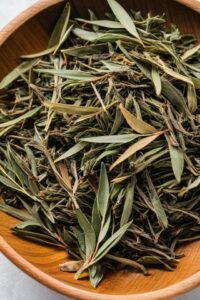
- However, herbal treatments adopt a different strategy. For generations, folk medicines, Ayurveda, and Traditional Chinese Medicine have all made use of herbs. Herbs are holistic, gentle, and made to work with the body rather than against it, in contrast to chemical remedies that are quick fixes.
- They feed the scalp and fortify the hair while addressing the root cause of itching, be it dandruff, fungal infections, or dryness.
- Neem, for instance, is well known for having antifungal and antibacterial qualities, which makes it a good remedy for dandruff. Aloe vera immediately soothes inflammation and balances moisture because to its cooling and moisturizing properties.
- While rosemary promotes circulation and promotes the general health of the scalp, tea tree oil acts as a natural antiseptic to combat fungal diseases.
- The long-term safety of herbal remedies is another factor that makes them unique. Herbs are safe for regular usage, in contrast to synthetic products that frequently have negative consequences like dryness or rebound dandruff.
- They fortify the scalp barrier and gradually restore equilibrium, preventing itching from returning. Herbal remedies can also be tailored to suit specific needs, whether you like to use them in herbal shampoos, oils, rinses, or masks.
- Because of this, they are widely available, adaptable, and quite successful on all hair types.
2. Understanding the Root Cause of Itchy Scalp
- Most individuals instantly search for quick remedies, such as cooling serums or anti-dandruff shampoos, when they have an itchy scalp. But even the best products might not provide long-lasting comfort if the true core problem is not understood.
- The scalp is a living ecosystem, just like the skin on the rest of the body. The presence of bacteria, pH levels, moisture, and oil balance all have an impact.
- Itching and irritation are normal reactions to any of these disturbances. Let’s examine the most frequent causes of persistent itching scalps. Most people first look for solutions when they have an itchy scalp.
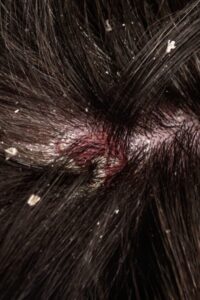
- 1. Dryness and Dehydration
- Simple dryness is one of the main reasons of itchy scalps. Similar to how our skin gets tight and flaky in the winter, the weather, regular shampooing, and exposure to heating and air conditioning can all cause the scalp to lose moisture.
- Microcracks, stiffness, and itching result from a dry scalp’s inability to produce enough sebum, or natural oil, to protect itself. In this situation, tiny, white, powdery flakes typically emerge. They are not oily like dandruff, yet they nevertheless make people feel uncomfortable and embarrassed.
- 2. Dandruff and Fungal Overgrowth
- The most frequent cause of itching scalps is still dandruff. It is brought on by an overabundance of Malassezia, a naturally occurring yeast that feeds on scalp oils.
- Excessive growth of this fungus causes skin irritation, inflammation, and the shedding of big, greasy, yellowish flakes. Persistent itching and redness are common symptoms of dandruff.
- Dandruff frequently returns because chemical shampoos only temporarily lessen flakes and rarely address the fungus imbalance.
- 3. Product Buildup
- With the abundance of styling products, conditioners, serums, and sprays available today, product accumulation is increasingly being identified as a contributing factor to itchy scalps. These products’ residues clog hair follicles, trap debris, and change the pH of the scalp when they build up on the scalp. This causes inflammation by providing a haven for germs and fungi. Herbal clarifying rinses are a useful remedy because even shampoos with thick silicones or waxes can exacerbate this issue.
- 4. Skin Conditions
- Sometimes the itching is a symptom of a more serious skin condition rather than just a straightforward scalp problem. Chronic inflammation, scaling, and itching of the scalp can be caused by conditions including eczema, psoriasis, or seborrheic dermatitis. Herbs can help reduce flare-ups and soothe sensitivity in these illnesses, but medical advice may still be required. This calls for a more holistic approach.
- 5. Allergic Reactions and Sensitivity
- Many people get itchy scalps as a result of chemical preservatives in shampoos and conditioners, hair colors, or artificial fragrances. Contact dermatitis is a disorder that can produce itching, redness, or even tiny pimples on the scalp right away. In these situations, switching to herbal, fragrance-free treatments frequently results in immediate relief.
- 6. Lifestyle and Diet Factors
- Stress, poor diet, and dehydration all play a hidden but significant role in scalp health. A lack of nutrients like zinc, vitamin E, or omega-3 fatty acids can weaken the scalp barrier, making it more prone to irritation. Similarly, stress hormones trigger inflammation that worsens itching and flaking.
3. Top Herbal Remedies for Itchy, Flake-Free Hair
- Herbal therapies have the advantage of long-term scalp nourishment and protection in addition to pain relief. Herbs function at the root level, regulating oils, reducing inflammation, and enhancing circulation, in contrast to synthetic products that frequently cover up symptoms. The following are some of the best herbal remedies for flaky, itchy scalps, each with special advantages:
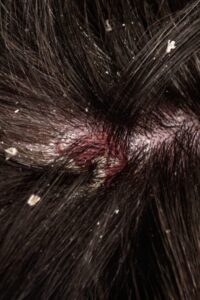
- 1. Neem – The Antifungal Powerhouse
- One of the most well-known plants for scalp care in Ayurveda is neem. Neem is rich in substances that have antifungal, antibacterial, and anti-inflammatory qualities, such as nimbidin and azadirachtin.
- This makes it very efficient against redness, irritation, and fungi that cause dandruff. Frequent application of neem oil massage or neem water rinses cleanses the scalp, minimizes flakes, and brings equilibrium back. Neem is a comprehensive remedy for scalp and hair health since it also fortifies hair follicles.
- 2. Aloe Vera – The Cooling Healer
- Aloe vera, sometimes referred to as the “plant of immortality,” is a natural scalp soother. Rich in polysaccharides, vitamins, and minerals, aloe vera quickly soothes dry scalp, lessens redness, and soothes irritation. Its natural enzymes keep the scalp clean without removing oil by gently exfoliating dead cells. Aloe is beneficial for mild dandruff and scalp inflammation because it also contains antibacterial properties.
- 3. Tea Tree Oil – Nature’s Antiseptic
- Tea tree oil is one of the most studied natural treatments. Its potent antibacterial and antifungal qualities aid in the fight against bacterial accumulation, fungal infections, and dandruff. Tea tree oil clears up pores, lessens itching, and makes the scalp feel more comfortable. It must always be diluted with a carrier oil prior to application because to its high concentration.
- 4. Rosemary – The Circulation Booster
- Rosemary is a potent hair tonic in addition to being a culinary herb. It enhances the delivery of nutrients to hair follicles by increasing blood circulation in the scalp. This promotes hair development, lessens dryness, and strengthens roots. Additionally, rosemary has modest antibacterial properties that help reduce itching and dandruff.
- 5. Fenugreek Seeds – The Flake Fighter
- Rich in lecithin, nicotinic acid, and protein, fenugreek (methi) seeds provide deep nourishment to the scalp and lessen flaking. They also reduce discomfort because to their anti-inflammatory qualities. Frequent use of fenugreek paste moisturizes the scalp, keeps dandruff at bay, and gives hair a natural sheen.
- 6, Hibiscus – The Cooling Conditioner
- Mucilage, a naturally occurring conditioning ingredient found in hibiscus flowers and leaves, calms and hydrates the scalp. It regulates oil levels and reduces dryness-induced irritation. Antioxidants found in hibiscus also fortify roots and delay the onset of graying.
4 Itchy Scalp No More: Herbal Secrets for Healthy, Flake-Free Hair
- 1. Why Your Scalp Gets Itchy: Common Causes You Should Know
- You might be surprised to learn how frequent itchy scalps are. Although many people believe that dandruff is the main cause, there are really a number of other reasons why your scalp may itch. Finding long-lasting relief begins with identifying the underlying reason.
- Dryness is one of the most frequent causes. Similar to the skin on your arms or face, your scalp may get flaky and dry, particularly during the winter or after using harsh shampoos. The natural barrier of the scalp is weakened by this dryness, which causes it to feel tight and uncomfortable.
- Fungal infections and dandruff are two other important causes. A yeast-like fungus called Malassezia can overgrow and cause dandruff. This fungus irritates the scalp by feeding on its oils, which results in flaking and itching.
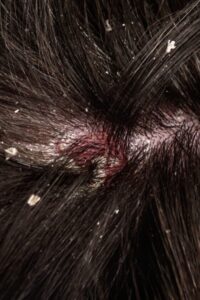
- Another problem that is often ignored is product accumulation. The residue from regular use of gels, sprays, or serums can irritate the scalp and block hair follicles. Ironically, excessive cleaning can exacerbate itching by depleting natural oils and making the scalp more sensitive.
- Many people have unidentified triggers for allergic reactions, such as those caused by sulfates, hair colors, or shampoo smells. These substances cause redness, pimples, or chronic itching on sensitive scalps.
- Finally, hormonal imbalances, poor food, and stress can all impair scalp health. Dryness, itching, and thinning hair are common symptoms of vitamin deficiencies, including those involving zinc, iron, and omega-3 fatty acids.
- 2. Aloe Vera – The Cooling Healer for Scalp Irritation
- Aloe Vera is the most effective remedy for itching. This succulent, also referred to as the “plant of immortality,” has long been utilized in traditional medicine and Ayurveda. Enzymes, amino acids, and vitamins A, C, and E are all included in its clear gel, which hydrates and soothes inflamed skin.
- Aloe Vera works particularly well for dry, itchy scalps. Its inherent humectant qualities keep moisture in and stop flakiness. Aloe Vera is good for oily scalps because it moisturizes without making the scalp oily, unlike artificial conditioners.
- Its antibacterial and anti-inflammatory properties are also strong advantages. Compounds like acemannan, which are found in aloe, lessen the burning, stinging, and redness brought on by fungal infections or allergic reactions. Seborrheic dermatitis and moderate psoriasis can be soothed with regular use.
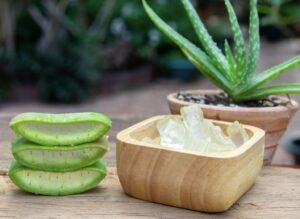
- Aloe Vera is easy to use. Fresh leaf gel can be applied straight to the scalp, massaged for 15 minutes, and then rinsed. Combine it with tea tree oil or coconut oil and let it sit overnight for added nutrition. For everyday maintenance, aloe-based shampoos and conditioners are also commonly accessible.
- Aloe’s cooling properties encourage hair growth in addition to reducing irritation. It increases blood flow to the scalp, which in turn stimulates hair follicles and provides vital nutrients to the roots.
- Aloe Vera is your go-to herbal remedy if your itchy scalp is caused by dandruff, dryness, or minor infections. It is a must-have for anyone suffering from scalp irritation because it is safe, natural, and provides immediate relief without any negative side effects.
5. Conclusion: Say Goodbye to Itchy Scalp the Herbal Way
- In addition to being painful, an itchy scalp can have negative effects on your social life, confidence, and even the health of your hair if left untreated. Although chemical-based shampoos frequently provide short-term respite, they hardly ever deal with the underlying issues. On the other hand, herbs complement your scalp.
- Nature provides everything you need for a healthy scalp, from the cooling moisture of aloe vera to the antifungal properties of neem, the growth-promoting properties of rosemary, the cleansing power of tea tree oil, and the mild comfort of peppermint and chamomile.
- The finest aspect? These remedies are safe, affordable, and sustainable. With consistent use, they not only relieve itching but also restore balance, promote hair growth, and prevent future scalp issues.
